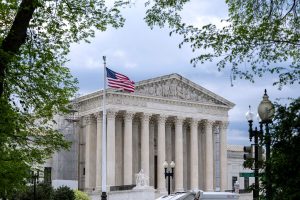States can block Medicaid money for health care at Planned Parenthood, the Supreme Court says
WASHINGTON (AP) — States can block the country’s biggest abortion provider, Planned Parenthood, from receiving Medicaid money for health services such as contraception and cancer screenings, the Supreme Court ruled on Thursday.
The 6-3 opinion by Justice Neil Gorsuch and joined by the rest of the court’s conservatives was not directly about abortion, but it comes as Republicans back a wider push across the country to defund the organization. It closes off Planned Parenthood’s primary court path to keeping Medicaid funding in place: patient lawsuits.
The justices found that while Medicaid law allows people choose their own provider, that does not make it a right enforceable in court. The court split along ideological lines, with the three liberals dissenting in the case from South Carolina.
Public health care money generally cannot be used to pay for abortions, but Medicaid patients go to Planned Parenthood for other needs in part because it can be difficult to find a doctor who takes the publicly funded insurance, the organization has said.
South Carolina Gov. Henry McMaster, a Republican, said Planned Parenthood should not get any taxpayer money. The budget bill backed by President Donald Trump in Congress would also cut Medicaid money for the group. That could force the closure of about 200 centers, most of them in states where abortion is legal, Planned Parenthood has said.
McMaster first moved to cut off the Medicaid funding in 2018, but he was blocked in court after a lawsuit from a patient, Julie Edwards, who wanted to keep going to Planned Parenthood for birth control because her diabetes makes pregnancy potentially dangerous. Edwards sued under a provision in Medicaid law that allows patients to choose their own qualified provider.
South Carolina argued that patients should not be able file such lawsuits. The state pointed to lower courts that have been swayed by similar arguments and allowed states such as Texas to act against Planned Parenthood.
The high court majority agreed.
“Deciding whether to permit private enforcement poses delicate policy questions involving competing costs and benefits — decisions for elected representatives, not judges,” Gorsuch wrote. He pointed out that patients can appeal through other administrative processes if coverage is denied.
McMaster, in a statement, said his state had taken “a stand to protect the sanctity of life and defend South Carolina’s authority and values — and today, we are finally victorious.”
White House spokesman Harrison Fields called the opinion “a major victory for common sense” and said it underscores the Republican president’s position that states should determine abortion policy.
In a dissent joined by her liberal colleagues, Justice Ketanji Brown Jackson said the ruling is “likely to result in tangible harm to real people.”
“It will strip those South Carolinians — and countless other Medicaid recipients around the country — of a deeply personal freedom: the ‘ability to decide who treats us at our most vulnerable,'” she wrote.
Planned Parenthood officials said the decision will hinder access to care like preventive screenings for 1 million Medicaid recipients in South Carolina. The state didn’t accuse Planned Parenthood of providing inadequate care, she said, calling the decision to cut it off a political one.
“Instead of patients now deciding where to get care, that now lies with the state,” said Katherine Farris, chief medical officer of Planned Parenthood South Atlantic. “If they fall on hard financial times, as many are right now, they are fundamentally less free.”
Other conservative states are expected to follow South Carolina’s lead with funding cuts, potentially creating a “backdoor abortion ban,” said Alexis McGill Johnson, president and CEO of Planned Parenthood Federation of America. Eighteen states weighed into the case in support of South Carolina.
Medicaid patients make up 3.5% of the organization’s South Carolina patients who go for services unrelated to abortion or gender-affirming care, officials said. Because South Carolina has not expanded its Medicaid program, reimbursements do not cover its preventive care costs, spokesperson Molly Rivera said.
Planned Parenthood will continue to provide care for women who need it in South Carolina, but won’t bill the government, said Vicki Ringer, a spokesperson for the South Carolina branch.
“This does not close us down despite the governor’s best efforts,” Ringer said.
Up to one-quarter of people in the U.S. use Medicaid, and lawsuits have been the only real way they’ve been able to make sure they can choose their doctor, according to court papers filed by the American Cancer Society and other public health groups. Removing the ability to sue could reduce access to health care, especially in rural areas, the advocates said.
Patient lawsuits are an important accountability tool because regulators “can’t possibly monitor all federal requirements in all states at all times,” said Julian Polaris, a lawyer who regularly advises state programs and health care providers. The ruling raises questions about whether patients can still sue to secure medically necessary services and eligibility determinations, he said.
In South Carolina, $90,000 in Medicaid funding goes to Planned Parenthood every year, a tiny fraction of the state’s total Medicaid spending. The state banned abortion at about six weeks’ gestation after the Supreme Court overturned it as a nationwide right in 2022. The conservative Christian legal-advocacy group Alliance Defending Freedom, which represented South Carolina officials, said the ruling would allow the state to direct Medicaid dollars to “comprehensive health care” for low-income patients.
___
Associated Press writers Jeffrey Collins in Columbia, South Carolina, and Meg Kinnard contributed to this report.
___
Follow the AP’s coverage of the U.S. Supreme Court at https://apnews.com/hub/us-supreme-court.
By LINDSAY WHITEHURST
Associated Press

